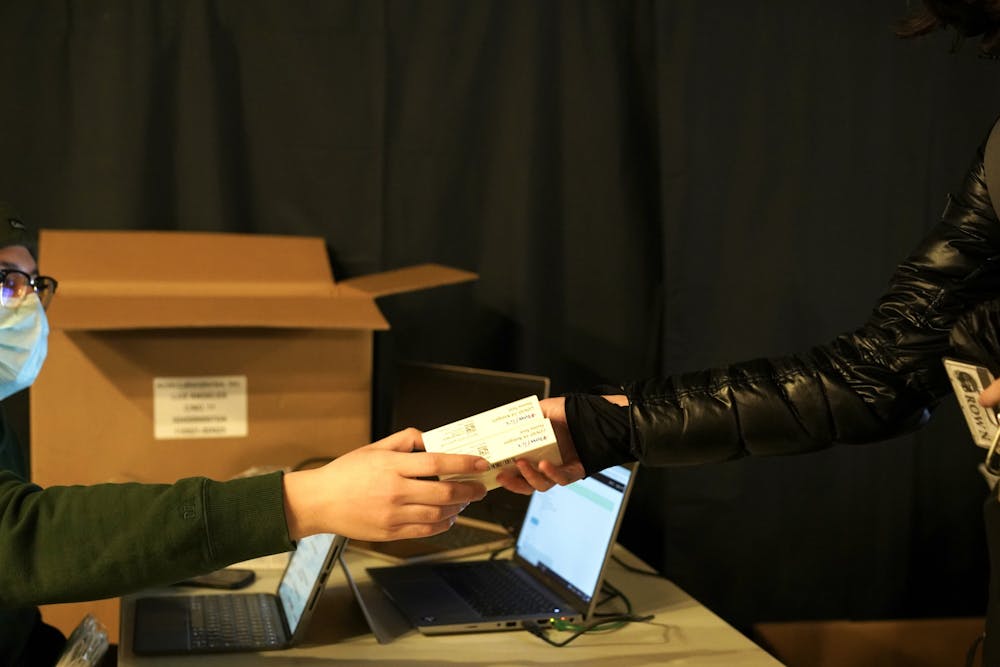With the recent authorization of updated COVID-19 boosters targeting Omicron subvariants, some University students have already begun seeking the new vaccine in nearby pharmacies.
The University has not yet released official guidelines regarding the new boosters — and while it is unlikely to mandate the jab, as it did the first three shots, the University plans to run a vaccine clinic in the coming weeks, according to Associate Vice President for Campus Life and Executive Director of Health and Wellness Vanessa Britto MSc’96.
Britto added that the University will strongly encourage students to get one of the new booster shots, especially with the possibility of the flu season “colliding with COVID.”
“The more immunity we have on our campus, the better, particularly as the weather gets colder and more and more of our activities are indoors,” Britto said.
What is a bivalent vaccine?
The Centers for Disease Control and Prevention authorized a third dose of the original vaccines for all adults in November 2021, meaning that most vaccine-induced antibodies may have waned in the months since many students’ last shots.
Those vaccines were formulated to fend off the original virus that circulated in the early parts of the pandemic. Since then, the virus has mutated significantly.
To adapt, vaccine manufacturers Pfizer and Moderna released new bivalent booster shots, meaning that they specifically target the Omicron BA.4 and BA.5 subvariants as well as the initial strain of COVID-19. The CDC and FDA finished the process of approving both vaccines at the beginning of September.
People 12 and older are eligible for the new Pfizer booster, and the Moderna booster is available to people 18 and up.
Students should get the shot “as soon as they’re eligible”
In April, the University announced that it would require “all employees and students remain up to date with their COVID-19 vaccinations” by CDC standards. Those CDC standards now say that people “are considered up to date with … COVID-19 vaccines immediately after getting your updated (bivalent) booster."
Britto said that while the University does not currently mandate the booster and she does not “see us mandating it, we would strongly recommend people get vaccinated as soon as they’re eligible.”
The new boosters are “going to give you more of a breadth of immunity,” Britto said. “It certainly addresses the ancestral strain, as well as what we’ve come to know as the more recent strain, BA.5.”
Kira Bierly ’23.5 recently got the new shot at a Walgreens in South Providence. She said she was relieved to get another booster, especially one that scientists say better prevents transmission of the Omicron variant.
“My last booster was almost a year ago,” she said. “I do know that getting your shots frequently is very important to make sure it’s still effective.”
Communicating with students about this particular round of boosters will present a challenge, Britto said.
“They may feel like they understand it already,” she said. “They don’t feel like they need to do it again.”
“We will certainly use this as an opportunity to educate people on why it’s a good idea,” she added.
After she came back from her appointment, Bierly said her friends asked her to send them information about signing up for an appointment.
“There was not a whole lot of awareness,” she said.
Where can you get a bivalent booster?
Currently, supply constraints in Rhode Island have kept the University from offering the booster on campus, Britto said.
“We’re in the queue,” she said. “We’re waiting to get the green light from” the Rhode Island Department of Health.
When RIDOH informs University officials that they have enough supply for a clinic, the University will send out a sign-up form to the community gauging how many vaccines they will need before holding a clinic similar to previous mass on-campus vaccinations, likely in the Health and Wellness Center. That process will likely play out over the next three to four weeks, Britto said.
But students who can access the vaccine off-campus before then should do so, she added.
“If you can get to a retail pharmacy that has the bivalent vaccine, please do,” she said. “And make sure that you document it on your cards.”
Emma Perkins ’23.5, who got her booster at CVS in Providence Place mall, said that she and her friends did not know they were eligible for the booster until her sister got an appointment for the shot.
“It would have been very nice for it to have happened on campus, but I haven’t heard any communication that something like that is going to happen,” said Perkins. “I decided I should just take the initiative myself.”
Bierly also noted that some students might not be able to easily access transit to an external pharmacy.
“I have a car; it was not a big deal for me to drive two miles to this Walgreens and back,” she said. “There’s a role the University could play in that for sure.”
What if I recently had COVID?
People who tested positive for COVID-19 recently are eligible to get the new booster as soon as symptoms have passed. But they could consider waiting a few months to get a new Omicron booster, according to White House COVID-19 Response Coordinator and Dean of the School of Public Health Ashish Jha.
“If you’ve had a recent infection or were recently vaccinated, it’s reasonable to wait a few months,” Jha said last week. According to the CDC, “reinfection is less likely in the weeks to months after infection.”

Katy Pickens was the managing editor of newsroom and vice president of The Brown Daily Herald's 133rd Editorial Board. She previously served as a Metro section editor covering College Hill, Fox Point and the Jewelry District, housing & campus footprint and activism, all while maintaining a passion for knitting tiny hats.

Will Kubzansky was the 133rd editor-in-chief and president of the Brown Daily Herald. Previously, he served as a University News editor overseeing the admission & financial aid and staff & student labor beats. In his free time, he plays the guitar and soccer — both poorly.





